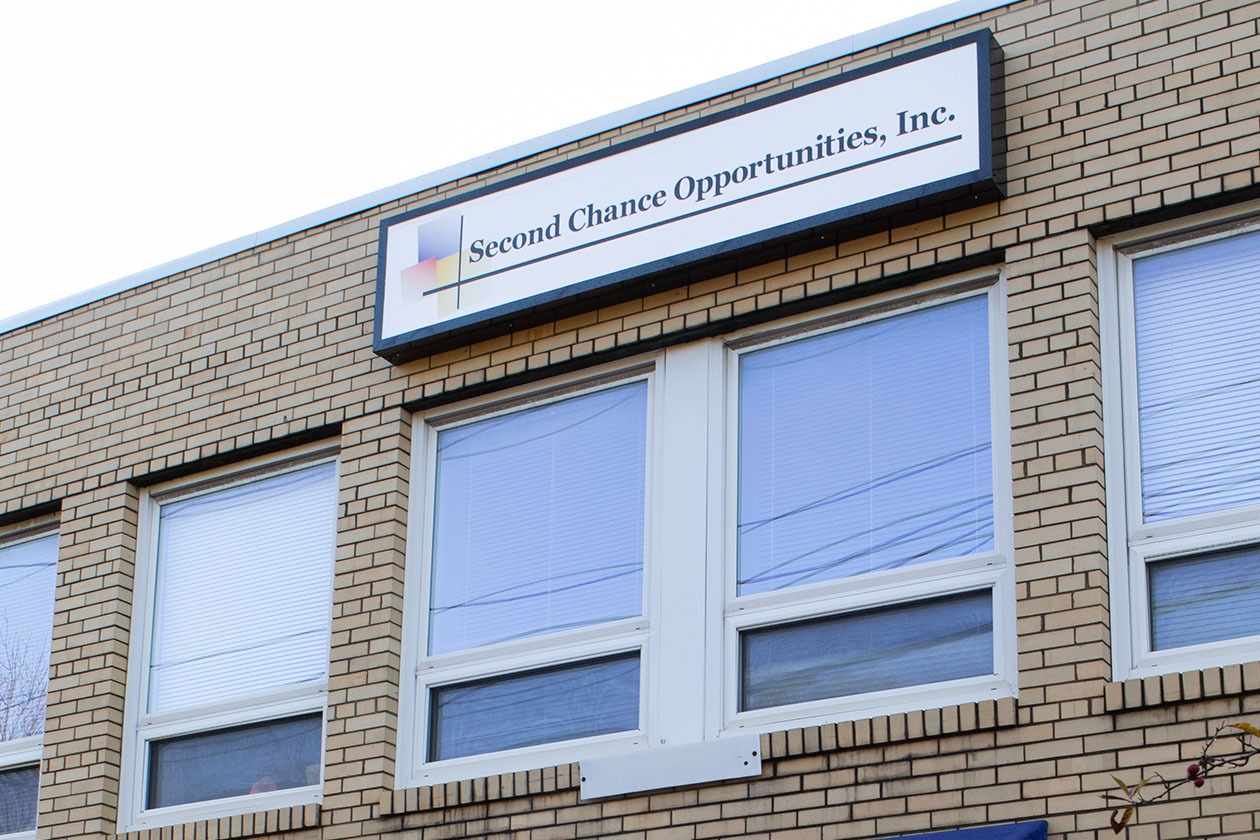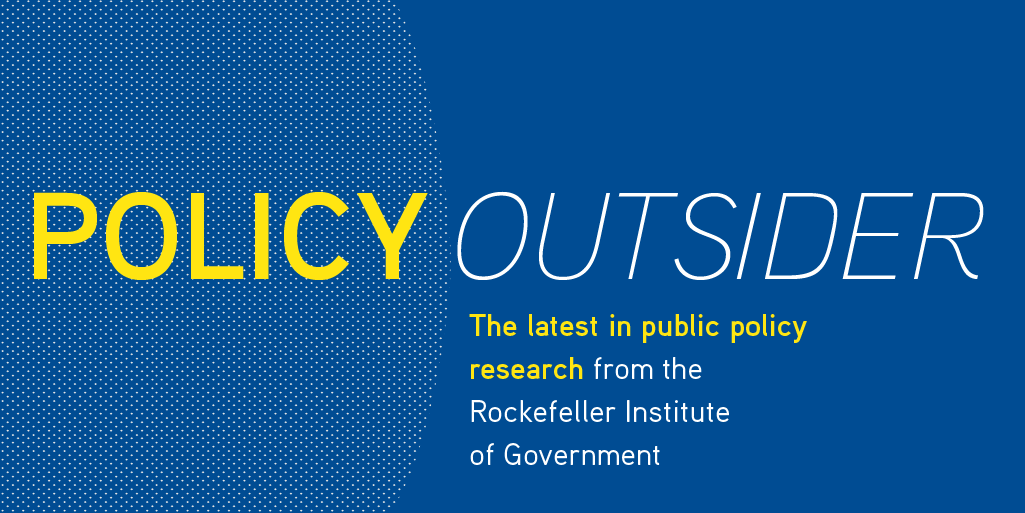Over the last year, Rockefeller Institute researchers have continued to contribute meaningful work across a broad range of issue areas with respect to public policy in New York State and the nation as a whole. Most saliently, perhaps, their work has focused on key topics related to environmental health and climate policy, drug policy, healthcare policy, education and workforce policy, and immigration policy. As in previous years, we invited Rockefeller staff to write about their favorite pieces from this past year as we begin to think about what’s next in 2024. Here are the pieces they chose to highlight!

Lead Service Line Replacement
Heather Trela, director of operations and fellow
One of the Rockefeller Institute publications that I learned the most from this year was Laura Rabinow’s recent deep dive into lead service line replacement. The health risks of lead exposure, especially for children, have been well documented for decades, but the replacement of lead service lines that may contribute to such exposures has been slow. Rabinow outlined efforts by local and state governments, as well as the federal government, to remedy the problem by replacing service lines made of lead and the challenges they continue to face in doing so, such as accurate inventory of the location of the lines and the potential financial costs involved that often make this a complicated endeavor. The piece is a good explainer of the efforts that are being made both by the federal government and right here in New York State and the policy needs related to meaningfully address the pressing issue of lead exposure as aging drinking water infrastructure corrodes and the possibility of exposure increases. This report is especially timely given the recent regulatory proposal by the Biden administration that would require replacing the nation’s lead service lines over the next ten years.

Courts and Marijuana Policy
Leigh Wedenoja, chief economist
New York legalized adult-use recreational cannabis in March of 2021 but the rollout of regulations and permits has been slow. The Office of Cannabis Management (OCM) lists only 26 licensed recreational dispensaries on their website as of December 2023. This year, Heather Trela took a deep dive into the legal challenges, and the facts underlying them, that have resulted in a slowed recreational cannabis rollout in New York and other states. In her “High Courts” series, Trela identifies multiple areas of jurisprudence under which state-level cannabis regulations have been challenged, including challenges to residency requirements for cannabis businesses, bans on cannabis export to other states, and social-equity programs intended to make licenses easier to obtain for certain groups. In New York, those special licenses are for Conditional Adult-Use Retail Dispensary (CAURD). In a follow-up piece, Trela expanded her discussion of CAURD licensing challenges, as well as judicial challenges, to a proposed cannabis ballot initiative in Florida. State-level cannabis policy is likely to remain a difficult but important issue going into 2024, especially as the federal government has taken steps towards “rescheduling” cannabis at the federal level.

Substance-Use Disorder Recovery
Laura Rabinow, deputy director of research
Rockefeller’s ongoing work on the overdose epidemic and its persistence as a public health crisis has reflected the critical need for recovery resources and programming. Provisional data for 2023, unfortunately, demonstrated that nationally “we are on pace for deaths to exceed previous years yet again.” Consequently, one of the most meaningful and locally grounded pieces of research the Rockefeller Institute published this year was the report Beyond Treatment: Understanding the Impact of Supporting Recovery at Second Chance Opportunities. In this commissioned report, Leigh Wedenoja and Laura Schultz studied the impact of services provided by Albany-based Second Chance Opportunities (SCO) for individuals in recovery from substance-use disorder, as well as for the broader community. Those in recovery face multifaceted challenges that are often interdependent but for which services and support can be diffuse or difficult to find. The report measured the impacts of the wraparound services provided by SCO—including its recovery community center, employment services, recovery coaching or mentorship, and recovery housing. In doing so, the report found that not only did the organization’s multipronged services provide meaningful benefits for individuals—such as more stable housing and employment that aid in recovery—but they also saved state and local governments $13,200 for every individual who can maintain their recovery.

Home Health Aid Shortage
Brian Backstrom, director of education policy studies
Continuing our focus on healthcare, the Spring 2023 cohort of the Rockefeller Institute’s Center for Law and Policy Solutions (CLPS) interns analyzed the current and projected future of the home health aide shortage in New York and the four other largest states, and tracked legislation in each state that was designed to address various aspects of the crisis. Our team outlined how the growing population of aging residents, and the growing desire of them to age-in-place, was creating a demand for nearly one million more home healthcare professionals than are in the workplace today. They further identified three broad but distinct categories of policy areas that were found to be in need of policy action to ensure that there would be sufficient growth in the number and retention of healthcare workers to meet the demand: 1) compensation and career growth opportunities; 2) working conditions; and, 3) public funding. Ultimately, in analyzing recent state policies proposed and enacted in the nation’s five most populous states, containing more than half of the country’s home healthcare workforce, however, they concluded that the states’ legislative response to the looming crisis did not largely align with those categories of need and were uneven across those states considered. Interestingly, during the course of their research project, our CLPS interns found that legislative activity on increasing access to and quality of home healthcare services far outweighed activity designed to grow the workforce. Noting the drive to increase use of services in a market already facing a million-person workforce shortfall, the team concluded: “Without the people who provide those services, we will fall short of addressing the existing and projected shortages in home care services.” Indeed.

Engaging with Experts on the Podcast
Alexander Morse, associate director of public policy and government strategy
Over the past year, the Rockefeller Institute’s Policy Outsider podcast has been a hub for thought-provoking conversations, bringing together experts and leaders to dive into critical topics that shape the landscape of policy, healthcare, education, and more in the state of New York.
One notable theme that emerged throughout the year in those conversations, as in our research, was healthcare. Amir Bassiri, the state’s Medicaid director, shed light on the intricacies of the Medicaid waiver system and the strategic initiatives designed to enhance its effectiveness. The discussions delved into the goals these waivers aim to achieve, the carefully crafted strategies for reaching those goals, and a visionary outlook for the future of Medicaid in the state. Shifting gears to the aging population, Adam Herbst, deputy commissioner for the Office of Aging and Long-term Care at the Department of Health, explored the development of New York’s Master Plan for Aging and the comprehensive process undertaken to address the unique needs and challenges of an aging demographic, providing a roadmap for the state’s future in care for the aging. Expanding access to and use of mental health services also was an important focal point across our conversations, with New York State Office of Mental Health Commissioner Ann Sullivan discussing the state’s groundbreaking $1 billion investment in mental health. This substantial funding aims to pave the way for innovative policies and programs to support mental health services.
Education policies also took center stage on Policy Outsider as Brian Backstrom, director of education policy studies at the Rockefeller Institute, analyzed the United States Supreme Court’s scrutiny of President Biden’s student debt relief plan. Backstrom’s insights provided a comprehensive understanding of the legal complexities surrounding this contentious issue. In a follow-up episode, Backstrom, alongside Nathan Fellow Rebecca Natow, dissected the Supreme Court’s decisions on the student debt relief plan and outlined the Biden administration’s subsequent actions to alleviate the burden on student debt borrowers.
The Institute did not shy away from addressing broader societal challenges. Assemblymember Catalina Cruz joined the podcast to discuss the role of research and policy for immigrant integration across healthcare, housing, legal assistance, education, workforce development, and more. Jo-Ann Yoo, executive director of the Asian American Federation and board member of the Institute on Immigrant Integration Research and Policy, expanded on policies at the federal, state, and local levels to combat increased violence against Asian Americans. Yoo’s perspective offered a comprehensive look at the role policy plays in safeguarding vulnerable communities. Nathan Fellow Sarah Rogerson continued the conversations on immigrant integration and the immigrant experience, discussing the legal and logistical hurdles migrants face as they seek to enter the workforce. This intersection of immigration law and workforce dynamics highlighted the multifaceted challenges facing many of New York’s residents.
As we close this chapter and look forward to the new year, the breadth of the Rockefeller Institute’s work in 2023 underscores the importance of such critical, constructive, and timely policy scholarship. And, it further emphasizes the need for engagement in ongoing conversations and collaborative efforts that shape policies addressing the dynamic challenges facing New York and beyond. Through this work, the Institute continues to foster a deeper understanding of the importance of public policy research to all of our everyday lives.

